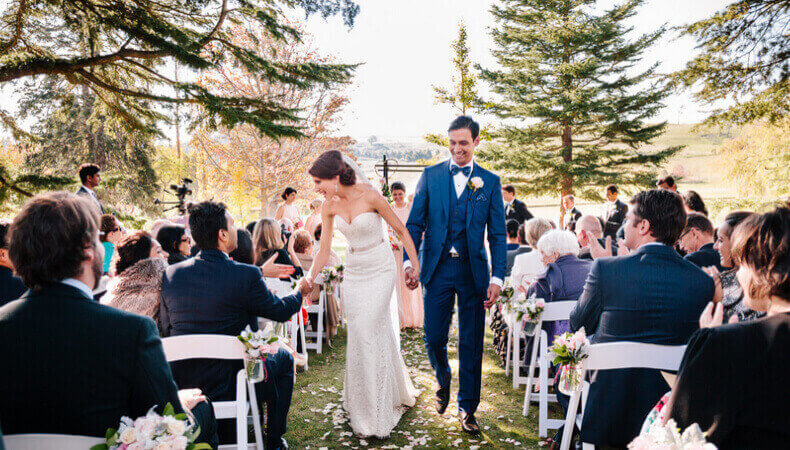To ensure that your wedding is perfect for you, you must sort out all of the details. Expenses are an important topic that must be addressed before the wedding day. Doing so will make your wedding planning much more manageable and comfortable.
Undoubtedly, setting a wedding budget is one of the most important aspects of wedding planning. But, before you can determine how much you can afford to pay for your wedding, you must first decide who will pay for it.
Things can be a little different these days because not everyone follows wedding etiquette. A lot of couples prefer to pay for their wedding expenses, which is fine. Some families divide things more equally, while others do not. There is no hard and fast rule for who pays for what in a wedding these days. Whatever works best for you is the best option these days. You must do what is best for yourself and your family. On the other hand, the list that follows is the traditional way of who pays for what in weddings:
1. The bride pays for the following things in the wedding:
- Groom’s wedding ring
- Groom’s gift
- Hair and Makeup for Herself
- Hair and Makeup for Attendants (If any)
- Gift for her parents
- Bridesmaids’ gifts
- And any costs associated with the bridesmaids, which may include out-of-town housing for the event.
2. The groom is expected to pay for the following expenses:
- Bride’s wedding band and engagement rings
- Bride’s gift
- Groomsmen gift
- Housing costs (if they are from out of town)
- Tuxedo and accessories for himself
- Flowers, Men’s Boutonnieres, Mothers’ and Grandmother’s Corsages, Bouquets and Flowers.
- Clergy or officiant fees
- The marriage license
- Honeymoon cost.
3. Here is what the groom’s parents are expected to pay for:
- Traditionally the parents of the groom are responsible for paying for the rehearsal dinner.
- Couple’s Honeymoon (Traditionally, the groom’s family pays for the honeymoon, but these days, the couple usually prefers to bear those costs themselves, or they set up a honeymoon registry so guests can contribute).
- In some areas, the groom’s family is expected to pay for the alcohol at the reception.
4. The bride’s parents are expected to pay for:
- The bride’s gown
- Flowers for the reception and the wedding
- Wedding photographer
- The reception expenses
- The wedding ceremony (venue, food, décor, and entertainment)
- Food and drink
- Entertainment
- The wedding cake
- Transportation expenses (if any)
- Engagement party (if an engagement party is thrown, they will pay for that also)
- Wedding invitations, thank you notes, and postage.
- Wedding favors
- Wedding stationery
- The wedding planner (if you hire one)
5. The bridal party picks up the following costs:
- Their own dresses
- The bridal shower
- Hair and Makeup for Bridesmaids
- Their own traveling expenses
- The bachelorette party
6. The groomsmen are responsible for covering the following costs:
- Their own clothing
- Their own travel expenses
- The bachelor party
These are the traditional aspects, but these days, responsibilities are being distributed to reduce the stress that comes with financial responsibility. Many times, the couple pays for their own wedding plans. Whatever you decide, everything should be planned ahead of time so that no one is caught off guard.
Who Pays for What in Weddings in 2022?
Despite the fact that many modern couples are breaking wedding traditions one after another, one practice is unbreakable: parents paying for the wedding. Many couples these days try to pay for some of the wedding costs themselves, but it appears that both sides of the family still contribute significantly.
Unlike couples born between the 60s and 80s, parents now pay the majority of their children’s wedding expenses. Earlier, couples used to pay nearly 80% of their wedding expenses, while their parents and other loved ones covered only 20% of the total cost.
According to a study, parents pay between 50 and 58 percent of their children’s wedding costs these days. However, if it’s a couple’s second marriage, they’ll most likely pick up the tab themselves, covering 90 percent of wedding costs while their parents and other loved ones contribute 10 percent.
Traditions have changed significantly over the past few decades. Today, there is no set rule as such. This is your wedding, and you can shift the financial responsibility accordingly to meet your specific requirements. Sometimes the groom’s parents will cover the entire cost with the bride’s parents. Often, a couple decides to pay for their own wedding so that they can have complete control. Whatever works best for your situation is best for both of you.
Wrapping it up…
Now you know who pays for what in weddings these days. BUT, money can be a source of contention. Moreover, whoever pays for the wedding will have a say in the wedding decision-making. This means that if your parents are paying for a majority portion of the event, they’ll have a say in every major decision related to the wedding, such as the wedding guest list, wedding venue, wedding decor, and other details. Moreover, they’ll also be listed as the event’s hosts on the wedding invitation.
So, be extra cautious when deciding on financial responsibilities. It is recommended to make a plan and stick to it. It will prevent you from arguing later, and everyone will be aware of what to expect. The plan should be discussed before the wedding with everyone involved.
Use this checklist as a guideline; it will bring clarity and help you make your day stress-free and memorable.
Happy Wedding….. ☺ ☺
Wear Mask, Maintain Social Distancing – Stay Safe, Stay Healthy!!







